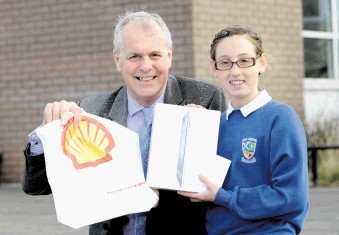
We are creating an A-Z of energy with the help of you – our Young Energy readers.
With your help, we are working our way through everything about energy, from coal to geothermal energy, through the letters of the alphabet. It is easy to take part – all you have to do is write no more than 250 words about this month’s letter, J, for “jack-up”. We’ll give you a clue, it’s a type of vessel used in the offshore industry. What are they? What do they do? Tell us.
The winning entry will be published in next month’s Energy supplement and its author will win one of the latest iPads for their school, thanks to Shell, which is supporting our A-Z. Entries must be marked with the pupil’s name, age and school. The deadline is October 26.
Thank you to all those who sent in entries for last month’s word, incineration, and well done to Erin McLean, from Dyce Primary School, for the winning entry.
Shell’s Inside Energy app is packed with information on energy through videos, animations and photo galleries.
To send your entry, e-mail elaine.maslin@ajl.co.uk.
o What is Incineration?
Incineration is when people burn things which are unwanted, normally rubbish, which then gets reduced to ashes. Incineration is a dying technology because the ashes affect people’s health so they don’t use it much anymore. Instead landfills are used.
o Which places use it?
Incineration is used by countries like Japan, Denmark, Sweden, Luxembourg, the Netherlands, Germany and France. Scotland is trying to use incinerators instead of landfill because it is not good for the environment.
o Advantages and benefits
For customers there are lots of advantages, like you only pay for what you use, lower heat costs and much more!
There are advantages for the environment, like it makes fossil fuels last longer. For Shetland and Europe it provides local jobs and reduces dependency on oil.
o Disadvantages
The ash harms people’s and animals’ health. However, there are also some disadvantages from incinerators when they ignite the rubbish.
When people burn the rubbish it gets reduced to ash, which is what can cause the adverse impact on peoples’ health.
o How does it work?
Incinerators work by using fire to convert waste into carbon dioxide and water vapour.
o Own opinion
Incineration is a good way of burning rubbish, but it harms people and landfill is not good for the environment so it isn’t good either.
By Erin McLean, from Dyce Primary School.